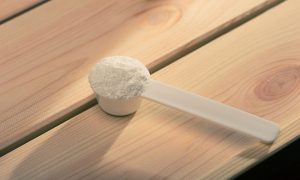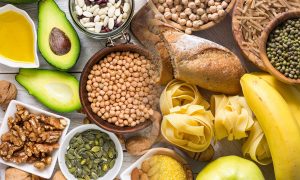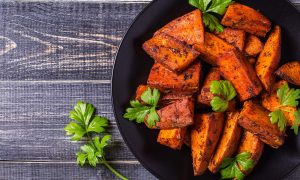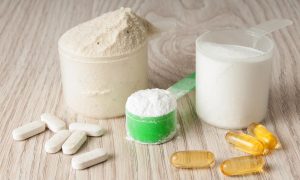How Should I Structure My Carb Intake On Workout Days?

|
|
Working out and training on a regular basis is absolutely fantastic, when your energy and motivational levels are through the roof. When you’re struggling to motivate yourself and find the energy to actually get off your butt and get some training done, well, then the entire experience is nowhere near quite as enjoyable. We all train with different goals and targets in mind, and we all have our own personal preferences in terms of the exercises and programs that we perform, but in reality, when you are training with specific goals and targets in mind, working out and training is only one half of the solution. The side of things that tends to cause most people the most headaches, is actually the diet and nutritional side of things, and rightfully so. Say for example, that you’re trying to bulk up and build muscle, despite what some may have you believe, in reality, training in the gym will only make up around 30% of your gains, with the remaining 70% depending on your diet and your nutrition. Eating right, and using the right supplements, is tricky enough, but not only do you need to know which foods and supplements to use, you also need to know when to use and consume them. When it comes to bodybuilding and resistance training, it is often protein that gets the most attention, and whilst it can’t be denied that protein is in fact, a crucial macronutrient, carbohydrates are considered by many, to be equally as important, which is what we’ll be focussing on in this article. Contained within, we’ll be looking at carbohydrates, the potential benefits of carb cycling, and how you should ideally structure your carbohydrate intake on workout days. So, without any more hesitation, let’s look at carbohydrates in more detail.
What are carbohydrates?

Carbohydrates are one of three macronutrients, the other two being fats and proteins, that are essential for the human body to function correctly. Carbohydrates are comprised of sugars, fibres, and starches that are found in foods such as fruits, grains, vegetables, and milk-based products. Nowadays, carbohydrates are often treated with disdain as many popular diet trends and fads would have us believe that they are detrimental to our bodies, especially in terms of fat loss, or fat gain, as the case may be. Whilst it is true that low carb diets are indeed very useful for stripping away body fat, if you know what you’re doing and consume the right carbohydrate sources, you can easily lose fat and build muscle, by still consuming plenty of carbohydrates in the process. Remember, as carbohydrates are macronutrients, they are still one of only three ways in which our bodies are able to obtain energy, and as you know, without energy, we simply would not be able to function. Furthermore, carbohydrates are the body’s primary source of energy from foods and supplements, as the body finds them the easiest to break down, process, and convert into energy. Looking at things from a molecular level, carbohydrates are called carbohydrates, because they are comprised of carbon, hydrogen, and oxygen.
So, how do carbs actually function
It’s easy for us to sit here and say that carbs are used by the body for energy, but that doesn’t really give you much information. It’s easy to say what something does, the tricky part is explaining how and why it does what it does. So, allow us to attempt to explain in relatively basic terms. You see, when we consume carbohydrate sources, as the body is only able to store carbs for a limited time, typically 2 – 3 days, the body, knowing that it only has these macronutrients for so long, is eager to use them up as quickly as it can. Carbs found in food we consume are broken down and converted into glucose, or into a form of sugar that can easily be converted into glucose molecules via the small intestine walls. After passing through the liver, glucose is then able to make its way into our circulatory system in our blood. This is why our blood sugar levels rise after we consume carbohydrates, and it is where insulin comes into the mix, which we’ll be looking at in more detail a little later on. From the bloodstream, the glucose is transported around the body, to our cells, which eagerly gobble up this energy as it is easier for them to absorb than fat. Once our cells have refuelled, any remaining glucose is stored via the liver, with some being kept for later on, in the event of blood sugar levels dropping too much, and the remaining being converted into body fat and being stored as an emergency energy supply for use at a later date. This is why low carb diets work so well with fat loss, because when there are no carbs left, the body is forced to use body fat for energy instead, which is why we store body fat in the first place. Put simply, carbohydrates fuel our muscles and central nervous systems, and they help ensure that we don’t break down and waste protein for energy.
Are all carbohydrates the same?

Just like not all fats are the same, with some being healthy, and some being bad, the same sort of principle applies to carbohydrates as well. When talking about carbohydrates, you’ve probably heard people talking about complex carbohydrates, and simple carbohydrates. The main difference between the two different kinds of carbohydrates is their chemical structures, which in turn can influence how quickly these sugars are able to be broken down and absorbed. Simple carbohydrates are made up of basic sugars and are designed to be broken down and absorbed via the bloodstream much quicker than complex carbohydrates, which is why they cause hormonal imbalances thanks to their insulin spiking abilities, which, actually, isn’t always a bad thing, but we’ll learn more about that a little later. These simple carbs contain one or two sugars, and are found in foods like fruit juice, candy, and syrups. Complex carbohydrates however, are made up of three of more different sugars, and are known as polysaccharides. These are found in starchy foods like beans, potatoes, rice, legumes, and whole grains. Because of their chemical structure, complex carbohydrates are much slower to be absorbed than simple carbs, meaning they provide sustained releases of energy after being consumed. Because they are slower to be absorbed and broken down, complex carbs don’t cause dramatic spikes in insulin levels.
So, what’s the deal with insulin?
So far we haven’t even looked at how you should structure your carb consumption on workout days, but don’t worry, we’ll get to that, once we’ve looked at insulin. You need to know about insulin before looking at carbs and working out, and you’ll understand why shortly. Insulin is basically a hormone secreted by the pancreas, that is designed to help stabilize blood sugar levels. It does this by taking glucose sugars in the bloodstream, as well as any other nutrients, and shuttling them into our awaiting cells much quicker. Insulin basically wants to get the glucose out of our bloodstreams, and into our cells, as quickly as possible.
How should you structure your carb consumption on workout days?

So, the big question, how should carb consumption be structured on workout days? Well, quite simply, there are a few things to consider.
Pre-workout – As mentioned, carbohydrates behave differently, depending on which sources they come from. Simple carbs are absorbed quickly, and can lead to quick bursts of energy, which is why we get sugar highs. Complex carbs however, are much slower to be absorbed, so consuming a bowl of oatmeal five minutes before hitting the gym, isn’t going to do much good. If you train early, it is recommended that you have NO/LOW carbs pre-workout for breakfast, and that you instead opt for a breakfast high in healthy fats. Smoked salmon, avocado, and scrambled eggs is a popular choice. The reason being is that, as no carbs will be present, the body will use all of the fats as a quick source of energy instead. If you train later in the day, make sure your complex carb source is consumed around 90 minutes before you workout, to provide maximum energy benefits.
Post-workout – Now, this is where things get interesting, and this is where insulin and simple carbs factor into the equation. Normally, if you were trying to build muscle and burn fat, you would stay away from sugary foods and beverages in the day, as the carbs would quickly be stored as fat. However, after working out, your cells in your muscles are completely empty of glycogen (a form of sugar used by the muscles for energy), meaning that the muscle cells are like sponges, just waiting to soak up all of the glycogen, carbs, proteins, amino acids, and any other beneficial nutrients. This is why bodybuilders will always have a whey protein shake, as soon as they finish working out. However, taking things one step further, if you include a simple sugar, a scoop of dextrose sugar powder for example, this then leads to a spike in insulin levels, which in turn then forces all of the nutrients contained in your post-workout shake, directly into your awaiting muscle cells, so the growth and repair recovery process, can immediately begin. On top of that, if your previous meal was a high fat, low carb meal, you can actually consume a complex carbohydrate and protein source as your next meal, providing you keep the fat levels for that meal low.














